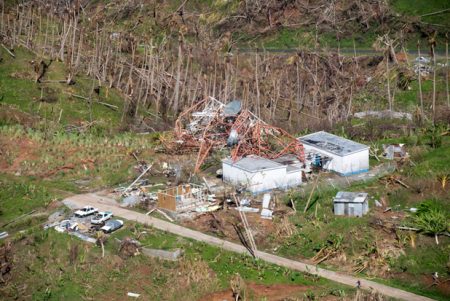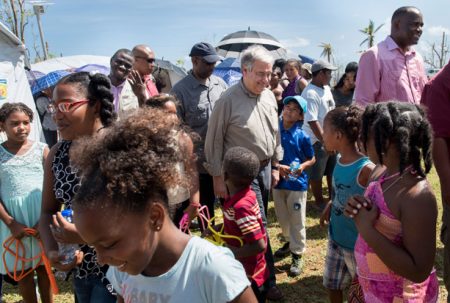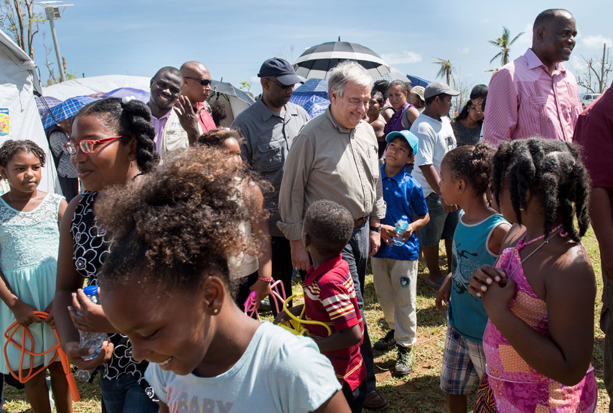– UN Secretary General
Touring hurricane-devastated Dominica yesterday, UN Secretary General Antonio Guterres says the level of support the island now needs cannot be attained through traditional instruments.
According to a transcript from the UN of a press conference he held yesterday in Roseau accompanied by Prime Minister Roosevelt Skerrit, Gutteres said: “…it is clear and it must be clear for the international community that the level of support that Dominica requires cannot be achieved through the traditional instruments. There must be, even if Dominica is a middle-income country, but a middle-income country with an enormous vulnerability that was proven in a very dramatic way, there must be a review of the way middle-income countries that are particularly vulnerable to external shocks, are supported with direct support with concessional loans. There must be new financial instruments, bonds of different natures, linked mainly to the buildup of resilience”.


Dominica was hammered by Category 5 Hurricane Maria on September 18, killing dozens of people and damaging or destroying 95% of the buildings on the island. Many communities on the island of 65,000 people were cut off from water and electricity.
He went on to say that there must be a way to assess the debt of these countries and to transform it into an “instrument of reconstruction and resilience”. He added that there must be a number of innovative ways of financing that are essential for the country to be able, even with the extraordinary effort of the Government and the people, for the country to be able to rebuild itself.
Gutteres pledged support for Dominica’s plan to become an entirely climate resilient country.
“…I would like to say how much I appreciate the vision and the wisdom with which the Prime Minister has claimed that, not only he wants the country to be reconstructed, but he wants the country to become the first entirely climate resilient country in the world and I would say the first green climate resilient country in the world because that is what I heard in the different meetings we had. In whatever we will be able to do, the United Nations is entirely at your side. We have been cooperating in your efforts with our limited capacity but I am proud that my colleagues are doing their best but our voice will be together with your voice claiming for the world to assume its responsibilities in relation to climate change for the Paris Agreement to be implemented…”
Earlier, Gutteres spoke about the devastation that he had witnessed on Dominica from Hurricane Maria’s rampage.
“I have never seen anywhere else in the world a forest completely decimated without one single leaf in any tree and even if I come from Barbuda, and in Barbuda, I could see also most of the houses destroyed, Barbuda is a small island linked to Antigua and Antigua can support Barbuda.
But your country is the whole country that’s been decimated and it’s been in every community I see. Most of the buildings destroyed or heavily damaged. And on the other hand, I was impressed by the effective response that your Government and your people with the resilience of your communities was able to put together”, he told the press conference.
Guterres said he wanted to ensure that the international community fully recognizes that the intensity of hurricanes and frequency in the Caribbean this season is not an accident.
“It is the result of climate change. I see sometimes people saying, well, we always have hurricanes, we always had storms, or we always had droughts. It is true. But what we never had is this intensity, this frequency and these devastating impacts. According to the research done by the World Meteorological Organization in the last 30 years, we have seen tripled the number of natural disasters and five times more the economic damage caused by them. And obviously, it’s climate change that is behind that”, he asserted.

